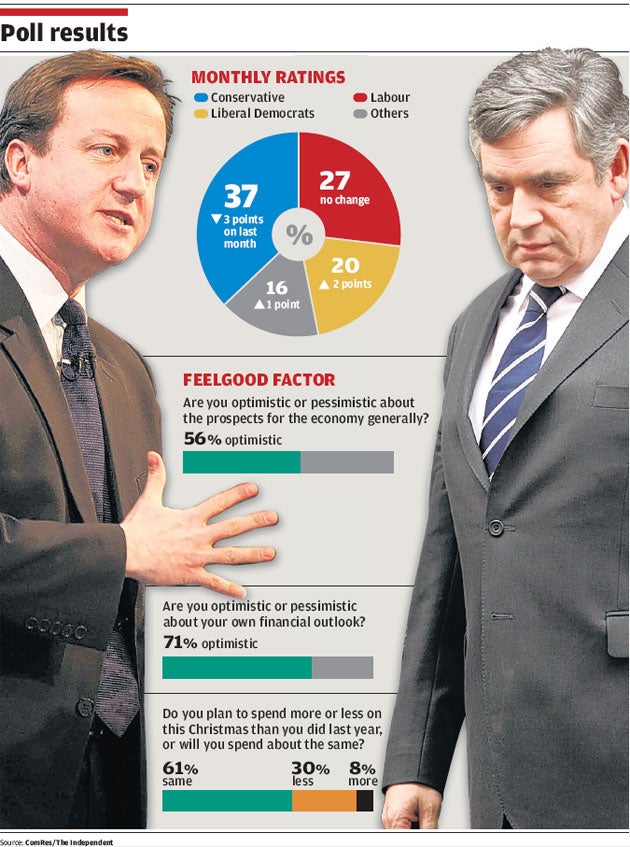UK heading for a hung parliament, poll shows
Labour closes gap to ten points as economic confidence returns

Your support helps us to tell the story
From reproductive rights to climate change to Big Tech, The Independent is on the ground when the story is developing. Whether it's investigating the financials of Elon Musk's pro-Trump PAC or producing our latest documentary, 'The A Word', which shines a light on the American women fighting for reproductive rights, we know how important it is to parse out the facts from the messaging.
At such a critical moment in US history, we need reporters on the ground. Your donation allows us to keep sending journalists to speak to both sides of the story.
The Independent is trusted by Americans across the entire political spectrum. And unlike many other quality news outlets, we choose not to lock Americans out of our reporting and analysis with paywalls. We believe quality journalism should be available to everyone, paid for by those who can afford it.
Your support makes all the difference.Britain is on course for a hung parliament after the general election amid growing optimism about the economy, according to the latest ComRes poll for The Independent.
It puts the Conservatives on 37 per cent (down three points on last month), Labour on 27 per cent (no change), the Liberal Democrats on 20 per cent (up two points) and other parties on 16 per cent (up one point).
Because of the way the first-past-the-post voting system works, the figures would leave the Tories six seats away from an overall majority if repeated at the election. They would have 320 seats, Labour 240, the Liberal Democrats 58 and other parties 14. These figures exclude those up for grabs in Northern Ireland. It is the second poll taken in the past two weeks to point to a hung parliament. An Ipsos MORI survey for The Observer, published nine days ago, put the Tories on 37 per cent, Labour on 31 per cent and the Liberal Democrats on 17 per cent.
The ComRes survey will raise Labour's hopes that the party might yet deprive David Cameron of victory and, if it can close the gap further, even hang on to office. Gordon Brown hopes the polls are starting to shift as people stop regarding them less as a "referendum" on the Government and think more about the "choice" they will make at the election, which is expected next April or May.
Labour strategists believe recent polls reflect greater scrutiny of the Tories' policies. Labour's private polling suggests the party's attacks on Mr Cameron's plans to raise the inheritance tax threshold to £1m have persuaded some voters the Tories are a "party for the rich".
And with the economy expected to start growing again in the final three months of this year, Labour will take comfort from the findings on the economy. According to ComRes, more people are optimistic than pessimistic about the British economy and their own economic prospects. Some 56 per cent say they are optimistic about the economy generally, while 41 per cent are pessimistic. When asked about their own financial outlook, 71 per cent are optimistic and 26 per cent pessimistic.
Younger people are more likely to be optimistic than older people about the British economy and their own financial prospects. Labour voters (74 per cent) are much more optimistic about the economy generally than Tory supporters (50 per cent) and Liberal Democrat voters (48 per cent).
People intending to vote Labour are the most upbeat about their own financial position: some 82 per cent are optimistic, compared to 71 per cent of Tory voters and 70 per cent of Liberal Democrat supporters. Some 61 per cent of people say they will spend about the same on this Christmas as last year, but 30 per cent believe they will spend less and only eight per cent are planning to spend more than last year.
Brown allies will hope that a closing poll gap will silence speculation about another attempt to force him to stand down before the election. However, some senior Labour MPs believe the party could do better with a different leader. The party appears to be held back by poor ratings among women. According to ComRes, Labour has the support of 30 per cent of men but only 25 per cent of women, while Tory support is much more evenly spread. The Liberal Democrats do much better among women (24 per cent) than among men (15 per cent).
Labour lead the Tories by 10 points among 25- to 34-year-olds. But Tory support from people who regard themselves as natural Tories (89 per cent) is higher than Labour's among people who identify most with Mr Brown's party (78 per cent).
The Tories believe they are still on course for an overall majority of up to 50 seats. They were relieved by a YouGov poll for The Daily Telegraph published at the weekend showing them with a six-point lead in 32 key marginal seats in the north. It put the Tories on 42 per cent, and Labour on 36 per cent, a reversal of the result at the last general election, when Labour won 44 per cent of the votes and the Tories 34 per cent.
n ComRes telephoned 1,003 GB adults between 27 and 29 November 2009. Data were weighted by past vote recall. ComRes is a member of the British Polling Council and abides by its rules. Full tables at www.comres.co.uk
Join our commenting forum
Join thought-provoking conversations, follow other Independent readers and see their replies
Comments